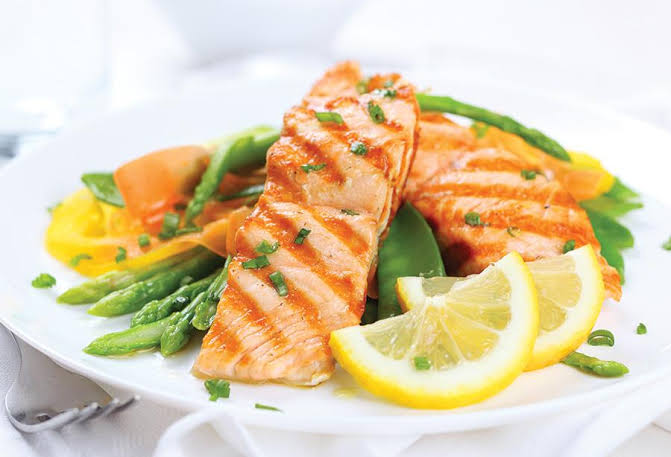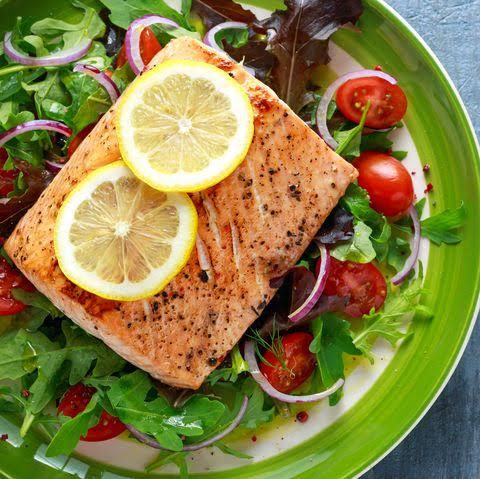
Are you on a diet? What types of food do you eat to achieve your fitness goal? In our modern times where a lot of people are more conscious about their food intake, pants size and weight really matter. Your food choices play a big role if you are aiming to drop a few pants sizes, this is an argument that a nutritionist and weight loss coach would both agree.
Portion control and exercise are obviously among the major factors that will contribute to any weight loss program but eating the right kinds of food can either make or break your diet plan above anything else. You might have already heard about good carbs and bad carbs, but proper diet choices go far beyond those choices. A limit on carbs intake is beneficial to your diet while a shift on your intake that includes higher portions of protein and unsaturated fats can help boost your metabolism resulting in a better state of health. To know how much protein you need in a day, click here to learn more.
Instead of choosing butter for cooking or topping your sandwiches with mayonnaise, try their healthy alternatives instead, like olive oil and avocado to bring in a kick to a plain lunch. And instead of devouring on a friend chicken or ground beef, try grilled chicken or bison steaks which is a healthier version of the mentioned viands.
However, the solution to weight loss is not just swapping any food that you want.
If you are serious to lose your extra weight, you have to work on increasing your chances of getting rid of your excess baggage and take advantage of the unique characteristics of each food. This may sound tricky, but this is not as complicated that you think it is. Recent research suggests that a slight alteration on your diet can do a dramatic change in your weight loss efforts, the adjustment on the food intake can be a transition of your lean meat consumption to lean fish. Despite the ideal weight-loss regimen belief that your meal should consist of a liberal amount of grilled chicken and broccoli, a recently published journal put an end to this false claim. It has been found out that eating fish instead of other lean protein products results in a rapid weight loss.
In a research study, experts have divided the pool of subjects into three categories:

The first one was given lean meat as their source of protein, the other one was given a cod and low-fat fish thrice a week as a replacement of the lean meat, and the last one was given a codfish five times in a week in place of the meat. The participants have strictly followed the protocol as part of their diet in the following 8 weeks. Even in a short period, researchers have noticed significant differences.
Based on the results, three servings of cod each week were already enough to notice a significant loss in weight and further weight loss occurs upon an increase in consumption of fish. With this occurrence, the group who has consumed cod five times a week has experienced better weight loss results, losing about 3.74 lbs more in comparison to the lean meat-only group. Their waist circumference and fat mass reductions gave superior results compared to other groups.
And in comparison to other weight-loss diets…
The plan followed in this experiment did not include an insanely high amount of protein paired with very few carbohydrates. 17% of the total calories came from protein, compared to 35% from fat and 48% from carbohydrates. This study has shown that dieting does not need to be extreme to lose more extra weight, you just have to make the smart choices on balancing a reasonable diet than can promote an impressive weight loss.
Fish is among the healthiest foods on the planet. It is packed with important nutrients like protein and vitamin D, a great source of omega-3 fatty acids that are incredibly important for the body and brain. It does not just help us get a better weight loss result, but it also has other health benefits that our body can benefit from.
Also Read: Best Healthy Fish Recipes for Weight Loss

It is high in important nutrients
Fish is packed with many nutrients that most people are lacking. It includes high-quality protein, iodine, and various vitamins and minerals. To meet your omega-3 requirements, eating fatty fish like salmon, tuna and sardines at least once or twice a week is suggested.
It lowers your risk of heart attack and stroke
Heart attacks and strokes are two of the most common causes of fatality across the globe and fish is considered as one of the most heart-healthy foods that you can eat. According to studies, people who eat fish regularly have a lower risk of heart attacks, stroke, and heart disease-causing deaths.
Contains nutrients that are crucial during development
Fish is high in omega-3 fatty acids like salmon which is essential for the brain and eye development. It is recommended for pregnant and breastfeeding mothers go get enough omega-3s and stay away from fishes that are high in mercury that causes brain developmental problems.
May boost brain health
Our brain function declines as we age, though a mild mental decline is pretty normal, the way to minimize or slow it down is to eat more fish in a week. Studies have shown that fish intake is linked to reducing mental decline among the elderly. Those who eat fish regularly also have more gray matter in the brain centers that control memory and emotion.
Helps prevent and treat depression
Depression is a common mental condition. It is characterized by low mood, sadness, a decrease in energy, and loss of interest in life and activities. Although it is not openly discussed as much as heart disease and obesity, it is currently among the world’s biggest problems. Researchers have found that people eat fish regularly especially those that are high in omega-3 aids combats depression and aids bipolar disorder.
A good dietary source of vitamin D
Vitamin D functions like a steroid hormone in the body. Fish and fish products are among the best dietary sources of vitamin D, Fatty fish like salmon and herring is an excellent source of vitamin D, an important nutrient in which 40% of people in the United States may be deficient.
May reduce the risk of autoimmune disease
Autoimmune diseases like type 1 diabetes occur when your immune system mistakenly attacks and destroys healthy body tissues. Eating fish has been linked to reducing the risk of type 1 diabetes and several other autoimmune conditions.
It helps prevent asthma in children
Asthma is a common disease that is characterized by chronic inflammation of airways and rates of this type of condition have dramatically increased over the past few decades. Studies have shown that children who eat more fish have a lower risk of asthma.
It protects your vision brought by old age
Age-related macular degeneration (AMD) is a leading cause of vision impairment and blindness that mostly affects older adults. Some evidence suggests that fish and omega-3 fatty acids may protect you against vision impairment and blindness.
Fish improves sleep quality
Sleep disorders have been incredibly common worldwide. High exposure in blue light may play a role in this type of concern but some researchers believe that vitamin D deficiency may also be involved, that is why preliminary evidence indicates that eating fatty fish like salmon may improve your quality of sleep.
Fish is easy to prepare and a good addition to a healthy meal, a good source of high-quality protein and is also packed with hearty omega-3 fatty acids. It also has several benefits including vision protection and improvement in mental health as we age.
You want to learn more on how to succeed with your weight loss journey? HERE!
Comments
0 comments


mexico pharmacies prescription drugs
https://cmqpharma.com/# buying from online mexican pharmacy
pharmacies in mexico that ship to usa
buy medicines online in india indianpharmacy com top 10 online pharmacy in india
http://canadapharmast.com/# legitimate canadian pharmacy
reputable indian pharmacies indian pharmacy paypal indian pharmacy online
https://canadapharmast.com/# canadian pharmacy mall
recommended canadian pharmacies canadian pharmacy india northwest canadian pharmacy
https://canadapharmast.online/# canadian discount pharmacy
buy doxycycline for dogs: doxycycline cost uk – doxycycline medicine
amoxicillin 500mg capsules price: can i buy amoxicillin over the counter in australia – buy amoxicillin online with paypal
doxycycline cream over the counter: doxycycline price south africa – doxycycline 40 mg generic cost
order generic clomid tablets: can i order cheap clomid without rx – where buy clomid without a prescription
doxycycline prescription uk: doxycycline brand – doxycycline for sale over the counter
price of doxycycline in india: doxycycline 7.5 mg – buy doxycycline 100mg pills
doxycycline 100mg capsules cost: can i buy doxycycline over the counter in south africa – can you buy doxycycline over the counter australia